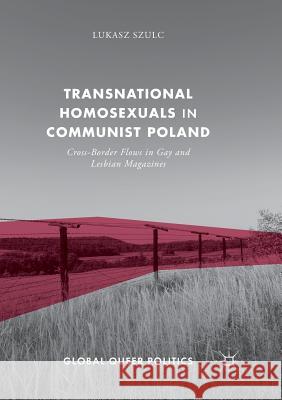Transnational Homosexuals in Communist Poland: Cross-Border Flows in Gay and Lesbian Magazines » książka
topmenu
Transnational Homosexuals in Communist Poland: Cross-Border Flows in Gay and Lesbian Magazines
ISBN-13: 9783319865058 / Angielski / Miękka / 2018 / 253 str.
Transnational Homosexuals in Communist Poland: Cross-Border Flows in Gay and Lesbian Magazines
ISBN-13: 9783319865058 / Angielski / Miękka / 2018 / 253 str.
cena 112,68
(netto: 107,31 VAT: 5%)
Najniższa cena z 30 dni: 107,92
(netto: 107,31 VAT: 5%)
Najniższa cena z 30 dni: 107,92
Termin realizacji zamówienia:
ok. 22 dni roboczych
Bez gwarancji dostawy przed świętami
ok. 22 dni roboczych
Bez gwarancji dostawy przed świętami
Darmowa dostawa!
Kategorie BISAC:
Wydawca:
Palgrave MacMillan
Seria wydawnicza:
Język:
Angielski
ISBN-13:
9783319865058
Rok wydania:
2018
Wydanie:
Softcover Repri
Ilość stron:
253
Waga:
0.33 kg
Wymiary:
21.01 x 14.81 x 1.47
Oprawa:
Miękka
Wolumenów:
01
Dodatkowe informacje:
Wydanie ilustrowane











